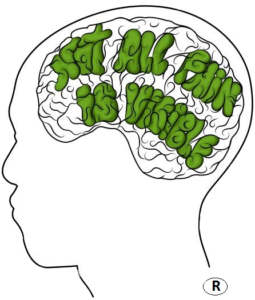Not all pain is visible
The Darren Clark Jr. Memorial is your bridge to education and resources on Mental Health. We do this through programs and events that provide the youth with knowledge and coping skills. Our goal is to reduce the number of suicides in our communities.
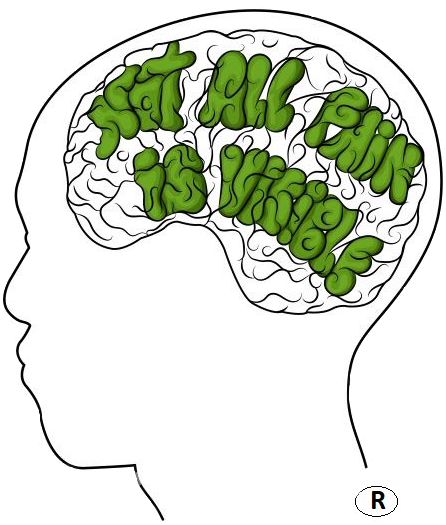
Tricky Tray Fundraiser
The Darren Clark Jr. Memorial’s annual Tricky Tray Fundraiser where all proceeds go towards bringing education and resources on mental health and suicide prevention.
Grab your family and friends and join us for an evening of fun and a chance to win great prizes!
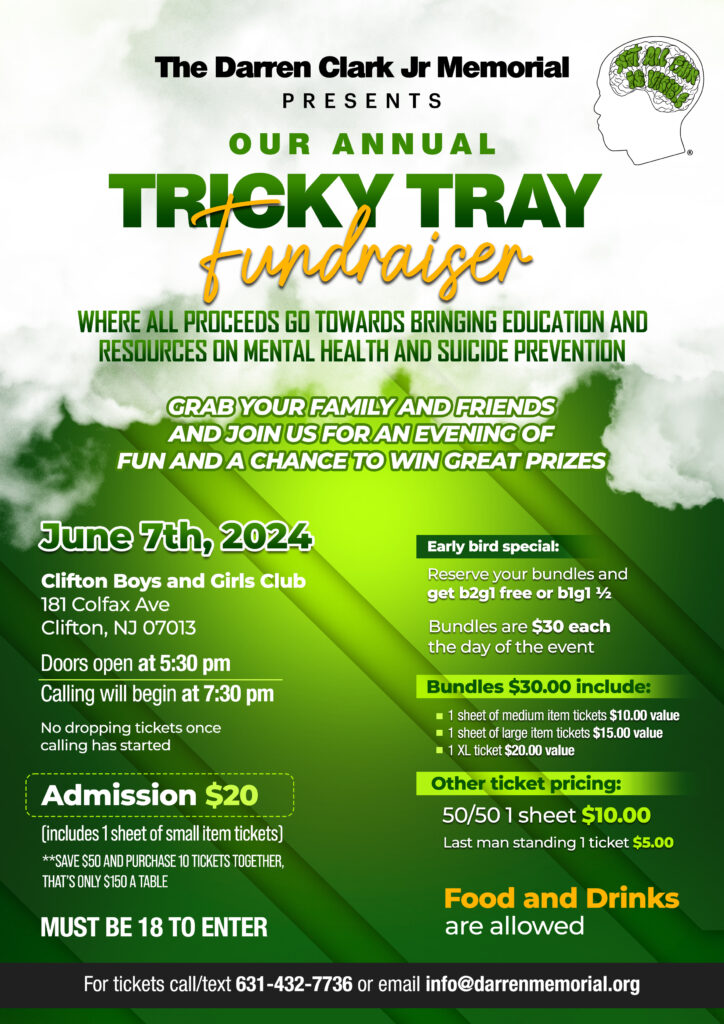
Yoga for Mind & Body
With Soo Yoon
Our Monday evening virtual Yoga sessions are a rejuvenating experience for all, whether you’re an experienced yogi or new to the practice. These sessions are accessible online, and you can join for just $10 per class. If you’re an active supporter of our cause, enjoy these virtual sessions for free as our token of gratitude for your ongoing support. Come and discover the benefits of Yoga in the virtual environment, where relaxation and inner balance await you.
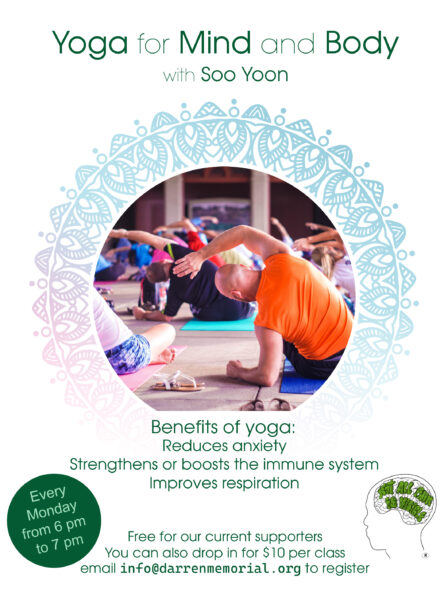
Darren's Gallery
Virtual Support group for those struggling with mental illness Held the last Tuesday of every month 7:00 pm – 8:30 pm All are welcome
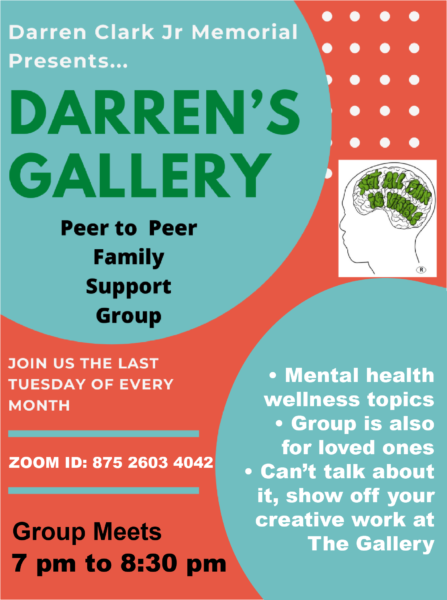
Back to School Mental Wellness Day
Annual mental health day for school-children in East Orange, New Jersey
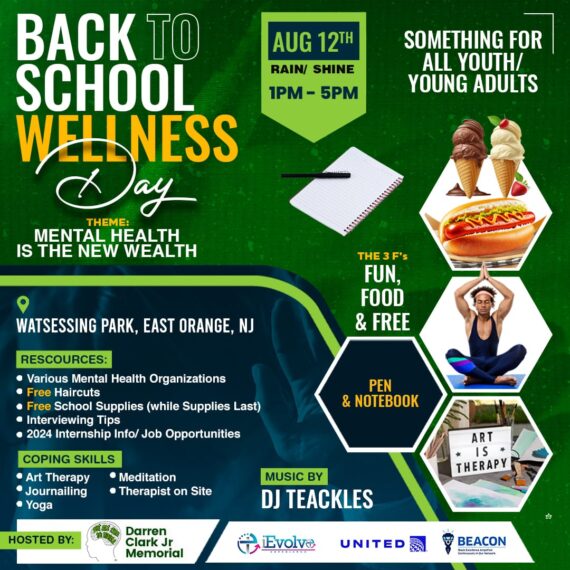
360 Arts All Around

360 Arts All Around, is a 6-week program for youth aged 7-17, that offers a creative platform where the fundamentals of various art forms are explored, all against the backdrop of mental health awareness. This program provides a secure space for young individuals to express themselves through art, fostering both artistic skills and mental well-being.
Mental Health Awareness
By fostering open conversations, eradicating stigma, and providing resources through community outreach, events, and campaigns that support Mental Wellness
Education
By empowering individuals with knowledge and skills through workshops, and resources to overcome challenges with Mental Health
Scholarships
To provide scholarships to those pursuing a career in the Arts field. This is through an essay contest where the winner receives a $500 Darren Clark Jr. Arts Scholarship. The choice of Arts stems from Darren's love for Art.
Mission
To bring education to family and friends of those suffering from Mental illness as well as implement coping skills and awareness in schools.
Vision
To reduce the stigma around mental health and reduce the number of loved ones we lose by suicide.

What is Mental Health?
Mental health is a person’s psychological, emotional, and social well-being. It covers various aspects of life, including how individuals think, feel, and behave. Good mental health means being able to cope with daily stressors, maintain positive relationships, adapt to change, and manage emotions effectively.
Mental health can be affected by numerous factors, including:
- Biological factors: Genetics, brain chemistry, and hormonal imbalances.
- Environmental factors: Stressful life events, trauma, abuse, and exposure to toxins.
- Psychological factors: Personality traits, coping skills, and thought patterns can influence how individuals respond to challenges.
- Socioeconomic factors: Poverty, unemployment, discrimination, and lack of access to quality healthcare.
Mental health conditions can affect anyone regardless of age, gender, ethnicity, or socioeconomic status. They include disorders such as anxiety disorders, depression, bipolar disorder, schizophrenia, eating disorders, and substance use disorders.
What could Mental illness look like?
Mental health covers a broad spectrum of feelings, thoughts, and behaviors, and it can vary greatly from person to person. Signs and behaviors associated with mental health can include:
- Mood changes Persistent feelings of sadness, hopelessness, irritability, or anxiety that interfere with daily functioning.
- Withdrawal: Social withdrawal, isolating oneself from friends, family, and usual activities.
- Changes in appetite or weight: Significant weight loss or gain, changes in eating habits, or appetite.
- Sleep disturbances: Difficulty falling asleep or staying asleep, oversleeping, or experiencing nightmares.
- Loss of interest: Losing interest in activities or hobbies once enjoyed.
- Fatigue: Persistent low energy levels, even after rest.
- Difficulty concentrating: Trouble focusing, making decisions, or remembering things.
- Physical symptoms: Unexplained aches and pains, headaches, digestive issues, or other physical complaints without a clear medical cause.
- Substance abuse: Increased use of alcohol, drugs, or other substances as a coping mechanism.
- Irritability or anger: Frequent outbursts of anger, irritability, or aggression.
- Risky behaviors: Engaging in reckless behaviors such as substance abuse, unsafe sex, dangerous driving, and trouble with the law.
- Self-harm: Deliberate self-harm behaviors such as cutting, burning, or other forms of self-injury.
- Suicidal thoughts or behaviors: Expressing thoughts of suicide, making suicide attempts, or engaging in behaviors that indicate a desire to harm oneself.
- Difficulty coping with daily tasks: Struggling to fulfill responsibilities at work, school, or home.
- Heightened sensitivity: Feeling overly sensitive to criticism, rejection, or perceived slights.
It’s important to note that experiencing one or more of these signs does not necessarily mean someone has a mental health disorder. However, if these signs persist for more than several weeks and interfere with daily functioning, it may be beneficial to seek support from a mental health professional. Additionally, everyone’s experience of mental health is unique, so symptoms can vary widely from person to person.
Media Articles
Get Involved
The Darren Clark Jr Memorial Foundation invites you to join the Stigma Free campaign.
Join our team. Message us telling us what you’d like to help us with!
